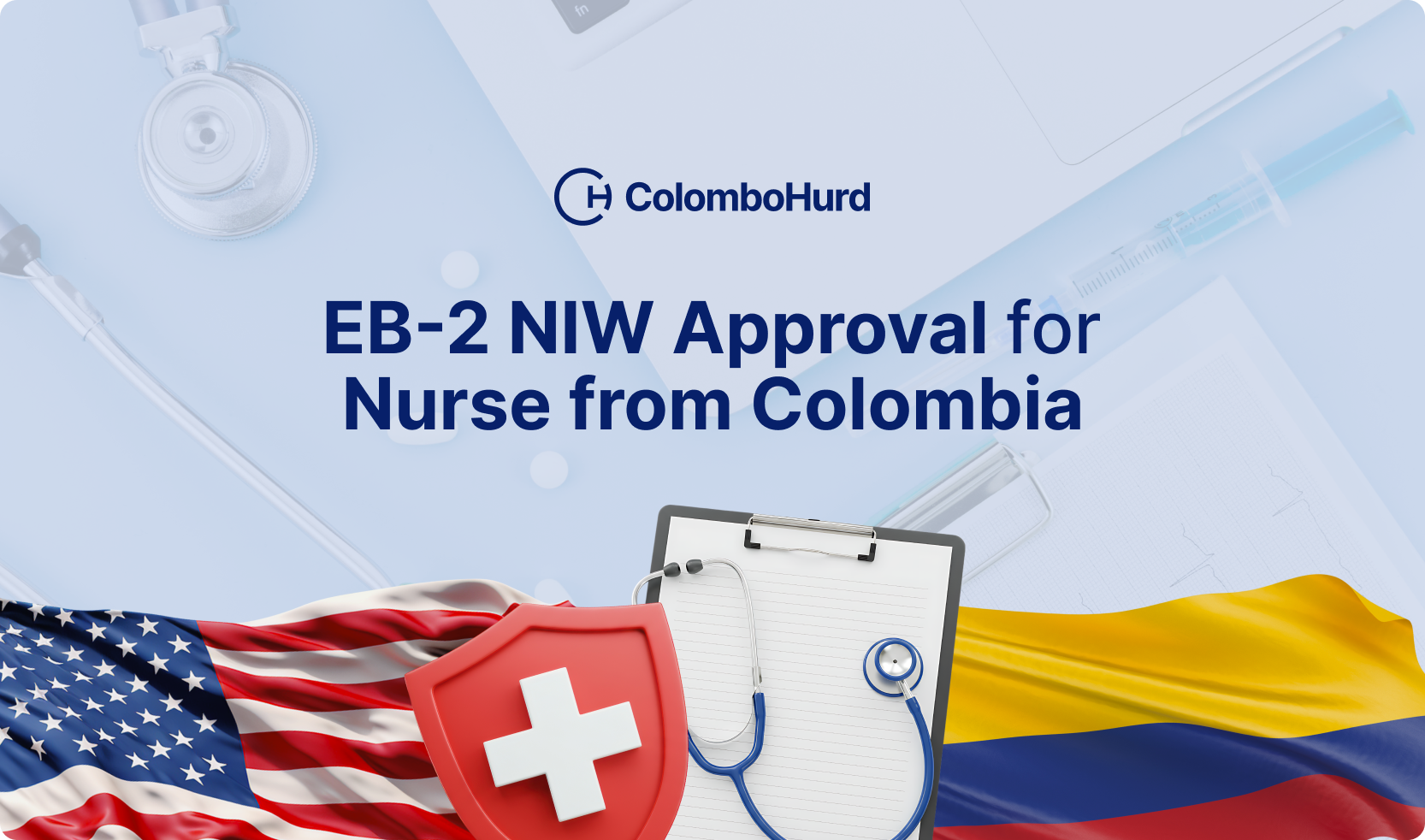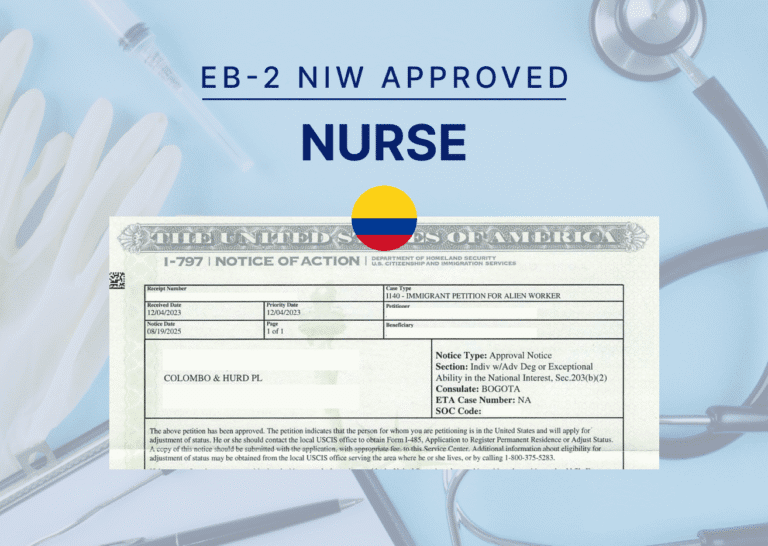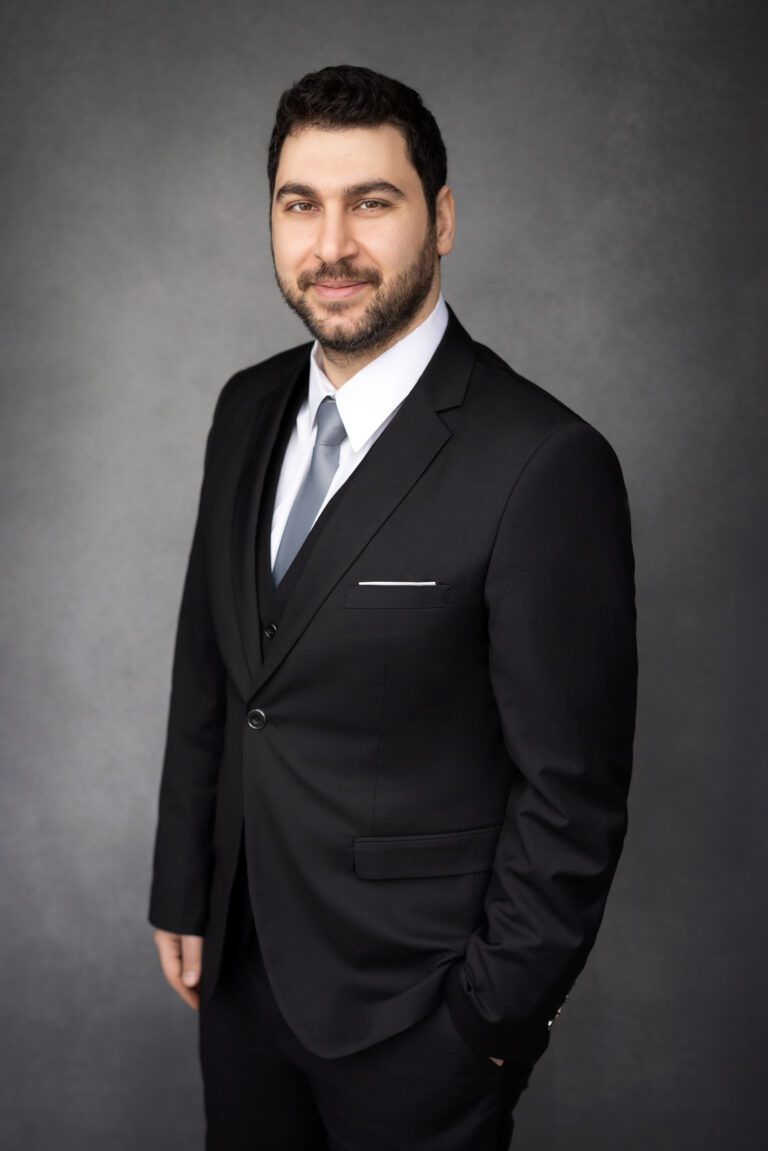Nurse
The United States faces a growing shortage of nurses, putting both patient care and the healthcare system’s resilience at risk. Immigrant nurses play a vital role in helping to fill this critical gap, bringing global expertise, cultural awareness, and specialized skills to areas of urgent need.
Our client, a Colombian nurse specializing in rare diseases, represents the valuable contribution that healthcare professionals can bring to the United States. Dedicated to earlier detection, better care, and stronger support, she secured approval for her EB-2 National Interest Waiver (NIW) on August 19, 2025.
This milestone allows her to continue her work in the U.S., expanding access to treatment, accelerating diagnosis, and improving care for rare disease patients nationwide. Immigration Attorney Nizar Kafrouni shares how we achieved approval for her endeavor.

Nurse at the Crossroads of Science, Advocacy, and Public Health
Over the past decade, our client has worked in healthcare, nursing, and rare disease care. She earned a doctorate in Nursing and dedicated her career to improving patient care and strengthening public health. Her background shows both deep expertise and a clear commitment to serving patients and families.
Building on this experience, she has developed a project that targets one of healthcare’s most challenging issues: rare diseases. By combining research expertise with frontline nursing experience, she aims to address pressing gaps in policy, education, and care delivery. Her work will support patient organizations, government agencies, and healthcare providers while ultimately enhancing the lives of individuals and families living with rare diseases.
Collaboration is central to her approach. Working closely with patients and their families, she treats them as active stakeholders in shaping solutions. In addition, her work brings together government agencies, scientific communities, healthcare providers, the pharmaceutical industry, and other partners across social, political, and economic contexts. Through these combined efforts, she aims to expand support systems, improve access to treatment, and ultimately enhance the lives of individuals and families living with rare diseases.
As Attorney Nizar Kafrouni explains, the EB-2 NIW is especially valuable for nurses and public health leaders whose work extends beyond the bedside:
“Unlike other visa options, the EB-2 NIW removes barriers such as US licensing and employer sponsorship required under different types of visa categories. It allows highly skilled professionals to focus on nationally important work in scientific research and innovation, healthcare policy reform, infrastructure development, technology and cybersecurity, social justice advocacy and public health initiatives. For our client, this freedom has been essential to continue her mission of transforming rare disease care in the United States.”
When Nursing Expertise Meets Immigration Scrutiny
Despite the client’s doctorate and years of dedication to rare disease patients, USCIS questioned whether her work carried national importance, a challenge many EB-2 NIW applicants face. Her frontline expertise improves patient care and drives programs that bring together families, hospitals, educators, industry, and government. Yet, officials initially underestimated the broader impact of her work.
This tension is common in EB-2 NIW cases, and as Attorney Kafrouni put it:
“One of the most common hurdles in EB-2 NIW cases is proving that specialized work rises above individual or localized benefit. While USCIS recognized our client’s qualifications and the merits of her rare disease efforts, they questioned whether her initiative carried national reach. In reality, her programs in education, advocacy, research, and patient services directly address systemic gaps that affect millions of Americans.”
At the same time, USCIS acknowledged the strength of her nursing background and the value of her rare disease research. They agreed she had the skills and experience to advance her goals: shortening the path to diagnosis, expanding treatment options, and giving families the support they desperately need.
What USCIS required, however, was stronger proof of her nursing-led initiatives’ impact on the U.S. healthcare system. They wanted evidence that training providers, improving diagnostic practices, and advocating for patient-centered policies would extend beyond the bedside and strengthen the U.S. healthcare system.
Aligning a Vision for Disease Care with National Priorities
Faced with the RFE, we knew the key was demonstrating how the client’s work went far beyond individual patient care and contributed to national priorities.
Connecting the Endeavor to U.S. Priorities
We highlighted how her plans aligned with major federal initiatives, including the Rare Disease Act, the Undiagnosed Diseases Program, and Healthy People 2030. These programs underscore the urgent need for better research, diagnosis, and care in the rare disease space. Her approach also mirrored global priorities, such as the United Nations’ call to eliminate neglect and exclusion for people with rare diseases.
Showing Broad Societal Impact
We emphasized the ripple effects of her work: fewer misdiagnoses, reduced healthcare costs, and stronger caregiver support systems. Her initiatives also offer economic benefits, including lower public spending and the creation of new opportunities in healthcare.
Or, in Attorney Kafrouni’s own words:
“We demonstrate how the petitioner’s work advances U.S. policy objectives and addresses pressing national needs. For this client, her rare disease initiatives align with federal frameworks such as the Rare Diseases Act and Healthy People 2030, illustrating that her educational, advocacy, research, and patient-centered programs have broad societal impact.”
See if you qualify
Get your free EB-2 NIW visa profile evaluation today.
A Victory for Rare Disease Care and Public Health
By directly connecting her nursing-driven work to federal health priorities and demonstrating its ripple effects on policy, treatment, and patient support, our strategy reframed USCIS’s concerns. They approved the EB-2 NIW petition, recognizing both the urgency of the rare disease crisis and the client’s ability to make a national impact.
As reflected by Mr. Kafrouni:
“EB-2 NIW approvals are especially rewarding because they recognize the contributions of individuals whose work will serve the national interest, allowing clients to continue advancing their fields and industries. In this case, the approval enables our client to fully pursue her mission in rare disease care, implementing patient-centered programs, educational initiatives, and advocacy efforts that improve diagnosis, treatment, and access across the United States. It not only validates her past achievements but also empowers her to make a lasting difference nationwide, strengthening public health infrastructure, promoting health equity, and transforming the standard of care for patients with rare diseases.”
In addition, with this approval, she now has the freedom to collaborate with government agencies, healthcare providers, and advocacy groups without being restricted by employer sponsorship.
Most importantly, her work will improve diagnosis, expand treatment options, and strengthen support systems for families facing rare diseases. She will not only improve the quality of life for those living with rare diseases but also enhance the nation’s overall healthcare system.
“The EB-2 NIW approval empowers her to make a lasting difference nationwide, strengthening public health infrastructure, promoting health equity, and transforming the standard of care for patients with rare diseases.”


